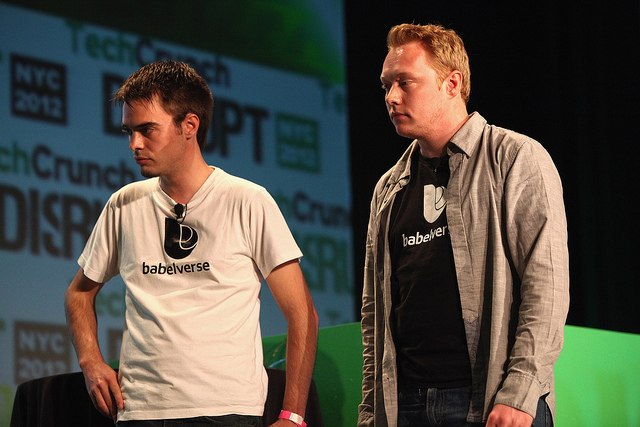Klint Finley
Klint Finley is a reporter for Wired, an occasional columnist for TechCrunch, and the co-host of the Mindful Cyborgs podcast. He has also contributed to publications such as Boing Boing, Oregon Business, ReadWriteWeb, Disinfo, and Shift.
Finley covers a range of topics for Wired such as startups, emerging tech, the Internet of Things, privacy, technology law, network neutrality, machine learning, open source, hacker culture, code literacy, and more.
The Internet makes it easy to collaborate across borders. But despite the rise of remote work and virtual teams, founders still need to travel for business sometimes. For some, travel practically becomes the job. And while data and capital now flow virtually unrestricted across borders, physical border crossing have gotten no easier. That’s causing headaches for global startups.
Take Babelverse co-founder Mayel de Borniol. He calls himself a “glomad,” which means a world traveler with no fixed address. Officially he’s a French citizen, but he prefers not to even think of himself as a citizen of anywhere — not even a “citizen of the world.”
That goes a long way to explaining the origins of Babelverse, which aims to be the universal translator of sci-fi lore. But instead of relying on machine translation, it relies on a network of human translators around the world. de Borniol and co-founder Josef Dunne, who is originally from the United Kingdom, came up with the idea while they were both living and working in Greece. Because they faced language barriers while living and traveling abroad, they found themselves calling friends on the phone to translate. That made them realize that they could build a translation app based on people instead of algorithms.
Two founders from different countries who speak different languages is exactly the sort of post-geographic collaboration that we’d hope to see happen thanks to the web. But the company’s post-geographic tendencies have caused them some trouble.

The two soon found themselves living in Santiago as part of the Startup Chile program. It was a great place to be, Dunne says, because there were so many other entrepreneurs from all over the world for the program. Babelverse, then, had a great focus group for testing the application, but it didn’t eliminate their need to travel. They traveled extensively in Latin American and to the U.S. to work on raising capital.
That led to some interesting experiences. Dunne says he was once pulled out of a security line in Canada, where a customs agent lectured him on the importance of smiling. He was also delayed for questioning on a return trip to the U.K. once by officials who didn’t quite understand what the Chilean government was paying him for. But the biggest issue the co-founders faced came after they returned to Europe after the Startup Chile money ran out.
They first went to Greece, where they met Zachary Zorbas, a U.S. citizen, graphic designer and fellow glomad. He was traveling in Europe and doing the occasional pro-gratis design gig for startups to keep his portfolio current. He started working on Babelverse and soon became crucial to the team. He ended up following the duo to London, where they stayed at Dunne’s parents’ garage and kept working on the service.
Broke but determined to take the company to the next level, the crew signed up for The Next Web conference in Amsterdam. But they didn’t have enough money to fly there, so they ended up renting a car instead. The conference was a breakout event for them — they won the people’s choice award and the best business-to-business award at the event. de Borniol stayed in Amsterdam while Dunne and Zorbas headed back to London.
And then things got weird.
Dunne says the border officials were immediately suspicious of the two young men driving a fancy car and returning from Amsterdam, which is better known to border officials for its cannabis cafes than its startup conferences. They were pulled out of line and separated for further questioning. Dunne was asked a few questions and released, but Zorbas was denied entry.
“They didn’t think I was ever going to leave,” he says.
Zorbas wasn’t entirely blameless, at least from a legal point of view. He was working for a European company without a work permit — even though he wasn’t getting paid it was still illegal. He was allowed to go back to his car to get his stuff. Dunne gave him the last of his cash and a credit card with about $100 on it before Zorbas was sent to the police station in France.
Fortunately for Zorbas, the French police had no interest in detaining him further. “They didn’t really know what to do with me,” he says. He was just released onto the streets with nowhere to go. Zorbas found his way to Paris and ended up sleeping in the airport for three days and wait for another startup he’d helped to pay for a ticket to get him back to the U.S.
Having their designer effectively deported was a setback for Babelverse, but it was one they overcame. Again, the Internet is handy for collaborating across borders. The team landed on its feet, winning the “Audience Choice” title at TechCrunch Disrupt New York and later landing a round of funding from 500 Startups. The company is now registered as a U.S. company and Zorbas works out of their San Francisco office.

But this is an example of what global startups have to face. The paperwork can be grueling — especially if you have a passport from the wrong country, as does Kunal Kalro, founder of the travel startup Outtrippin’. Although Kalro moved to the U.S. when he was 17 and lived here for several years, his student visa makes it “virtually impossible” for him to work here. So he’s in Santiago as part of Startup Chile.
Kalro was born in Dubai, but his parents are from India and he has an Indian passport — even though he’s never lived in India. He says he faces constant hassles when traveling. Border crossing are relatively easy for him, he says, because he has to plan so far ahead to get a visa. But it’s the visa situation that kills him. He says it takes about three weeks to get approval to travel to the U.K. from Chile. When he applied for a visa to travel to Brazil, he had to get a letter from his parents. He’s 25 years old.
“Entrepreneurs don’t necessarily have the ability to make plans that far in advance,” he says. “If an investor wants you to come visit, what are you supposed to do?”
Kalro suggests the creation of a “universal visa” — one application, one visa that’s good wherever you go. “I have a folder on my computer with like 50 visa applications,” he says. “And everyone is almost exactly the same.”
It’s not hard to imagine that most countries will still want to manage their own visa rules, but it makes sense to try to consolidate as much of the effort as possible. “It’s added regulation, but I will pay. I know lots of people that will pay,” he says.
de Borniol suggests that with so many countries trying to attract startups, perhaps one country could start offering citizenship to glomads. Such a nation would accept that these citizens would spend much of their time abroad, but would provide its citizens with valid passports and a place to register businesses. The idea reminds me of Adam Greenfield’s post-geographic nation-state.
Kalro also suggests “free travel zones” along the same lines as “free trade zones.” But it’s a tall order in a world still worried about terrorism, illegal immigration and national identity. The U.S. may have a free-trade agreement with Mexico, but it’s hard to imagine free travel between the border. It wasn’t long ago that we were literally building a fence (well, series of fences) across the border. Sentiment in countries like Greece is no better.
Still, as more companies are founded by people living in different countries, and investment capital continues to travel across borders, something is going to have to give.
Lead photo by Wandering Angel / CC































Comment